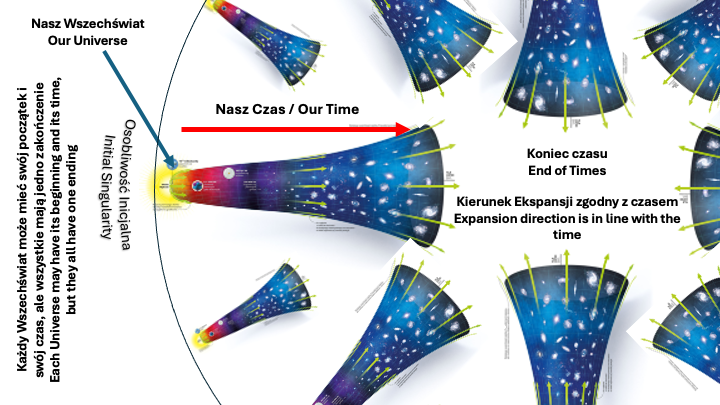Big Bang will collapse. Recent revelations coming from the James Webb Space Telescope may contribute to the Big Bang will collapse. Where scientists had expected very early objects, it has turned out that there are many more of them, and their estimated age means that they appear to be older than we think - while still retaining their youth. So will the Big Bang collapse, or rather some of its assumptions.
The Root Cause - the "Initial Singularity" according to the Big Bang Theory, had to exist in order for our Universe to appear, this element must be necessary for the expansion of the Universe. It is assumed that there was no "time" before the Big Bang, this means that "time" began to pass after the occurrence of the Initial Singularity. If this could have been the case, then time cannot exist without the "Initial Singularity", and this means that "time", our Universe must be in the territory of the "Initial Singularity".

So does the Expansion of our Universe look completely different? If the Expansion of our Universe takes place inside the "Initial Singularity", then our "time" has a finite value. If we assume that the "Initial Singularity" can correspond to a sphere, then our "time" must have a finite value. This means that "time will end" when it reaches a point in the center of the sphere. Since our "time" is in line with the direction of the Expansion of our Universe. We are only viewing information from the past. So will the Big Bang collapse?
Going further, if our Universe cannot exist without the "Initial Singularity," then the expansion of our Universe is done in a completely different way. The direction of Expansion of our Universe would then be from the outer boundary of the sphere (the Initial Singularity) to the central Point of the sphere - this means that time has a finite value. But. If this is the case, and if the Initial Singularity expands as our Universe expands, then … means that our "time" is slowing down. This means that the Big Bang will collapse?
The slowing down of time is accomplished the closer we are to the center of the sphere. The further we are from the center of the sphere, the "time" rushes faster. Therefore, the galaxies we observe are closer to the boundary of the sphere and escape faster - this more or less defines the Hubble-Lemaître Law - the escape of galaxies. Of course, the slowing down of our time is imperceptible by us - it's like 1 second per 1000 years - maybe? So, the Big Bang will collapse...?
All this could mean that our "time" will begin to slow down to zero, until it reaches the focal point of the "Initial Singularity" - this means that there are no changes at the focal point, which is a sign of the passage of time. Everything is heading to one point - the end of time, this can be interpreted as the heat death of the universe (the disappearance of all change). The last point - the direction of the expansion of the universe. The Initial Singularity must contain complete information for the origin of the Universe, the Scientific law, matter, time, space.
This means that the Initial Singularity has a specific plan for phenomena in the Micro-World and phenomena in the Macro-World. I am unable to imagine if the Initial Singularity did not have plans for the end of times. The end of our Times must also be in the territory of the Initial Singularity. This means that we have many ideas, but we are all heading in one direction.
Perhaps each Universe (Multiverse) may have a different dimension, a different time, but will eventually reach a common point - the center of the sphere of the Initial Singularity. If this is the case, then our "time" is directional and runs according to its arrow of time in accordance with the direction of the Universe's expansion. Could this be the interpretation that the Big Bang will collapse?
It seems that the next versions, the next Universes, should be better versions of ourselves. The expansion of the Universe seeks evolutionary, natural development - symmetrically to humanity. This may mean that the Big Bang will collapse with the achievement of a near-perfect state. Is that the sense that the Big Bang will collapse?

Brak komentarzy:
Prześlij komentarz